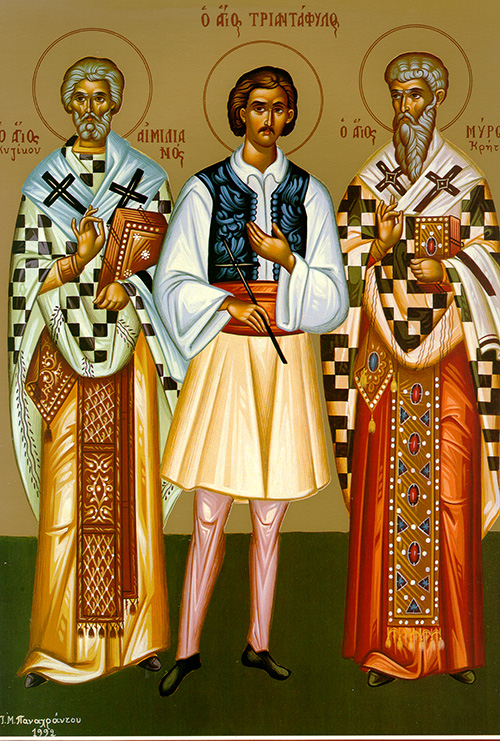

The holy confessor Emilian, Bishop of Cyzicus, lived during the reign of the Iconoclast emperor Leo the Armenian (813-820). He was summoned together with the other bishops to the court of the emperor, who insistently urged the bishops to refrain from the veneration of holy icons. St. Emilian was the first to tell the emperor firmly that the question of the veneration of holy icons ought to be discussed and decided only within the Church by its spiritual leaders, and not at the imperial court. In the year 815 he was sent to prison for the Orthodox Faith, where he died as a confessor.
Your life has shown you to your flock as a rule of faith, an image of gentleness, and a teacher of moderation. You acquired greatness through humility and wealth through poverty. O father and bishop Emilian, intercede with Christ our God to save our souls.
The Church recognizes you, O father Emilian, as an advocate of the most Holy Trinity, and she glorifies you with hymns of praise. You even laid down your life as proof of your devotion. For all of this we honor your memory. Deliver your servants from pagan invasions.
2 Corinthians 7: 1-10
Brothers and sisters: since we have these promises, beloved, let us purify ourselves from every defilement of flesh and spirit, and in the fear of God strive to fulfill our consecration perfectly.
Make room for us in your hearts! We have injured no one, we have corrupted no one, we have cheated no one. I do not condemn you. I have already said that you are in our hearts, even to the sharing of death and life together. I speak to you with utter frankness and boast much about you. I am filled with consolation, and despite my many afflictions my joy knows no bounds.
When I arrived in Macedonia I was restless and exhausted. I was under all kinds of stress — quarrels with others and fears writhing myself. But God, who gives hearts to those who are low in spirit, gave me strength with the arrival of Titus. This he did, not only by his arrival but by the reinforcement Titus had already received from you; for he reported your longing, your grief and your ardent concern for me, so that my joy is greater still. If I saddened you by my letter I have no regrets. Or if I did feel some regret (because I understand that the letter caused you grief for a time), I am happy once again; not because you were saddened, but because your sadness led to repentance. You were filled with sorrow that came from God; thus you did not suffer any loss from us. Indeed, sorrow for God’s sake produces a repentance without regrets, leading to salvation, whereas worldly sorrow brings death.
Mark 1: 29-35
At that time immediately upon leaving the synagogue, Jesus entered the house of Simon and Andrew with James and John. Simon’s mother-in-law lay I’ll with a fever, and the first thing they did was to tell Jesus about her. Jesus went over to her and grasped her hand and helped her up, and the fever left her. She immediately began to wait on them.
After sunset, as evening drew on, they brought to Jesus all who were ill, and those possessed by demons. Before long the whole town was gathered outside the door. Those whom he cured, who were variously afflicted, were many, and so were the demons he expelled. But he would not permit the demons to speak, because they knew him. Rising early the next morning, he went off to a lonely place in the desert; there he was absorbed in prayer.
Icon courtesy of Jack Figel, Eastern Christian Publications – ecpubs.com
Wednesday, August 7 –